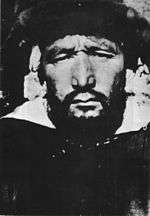Ospan Batyr
| Osman Batyr (Islamuly) | |
|---|---|
 | |
| Born |
1899 Koktokay County, Altay Prefecture, Xinjiang |
| Died |
April 29, 1951 Urumqi, Xinjiang |
Osman Batyr (Kazakh: Оспан батыр, Ospan batır, وسپان باتىر; Chinese: 烏斯滿·巴圖爾; sometimes spelled as Uthmān/Osman Bātūr, Osman Batir or Osman Batur)[1] (1899 - April 29, 1951), the son of Islambay, was born in Koktokay County, Altay Prefecture, Xinjiang, China. He first worked for the pro-Soviet Communist Uyghur Second East Turkestan Republic and Mongolian People's Republic during the Ili Rebellion, but switched sides, and defected to the Republic of China Kuomintang army. He then fought against the Mongols and the Soviet Union during the Pei-ta-shan Incident (Baitag Bogd).
In Xinjiang he led the Kazakh people to fight against the Communists. He was captured in Hami (Eastern Xinjiang), and executed in Urumqi on April 29, 1951, after resisting the Communist takeover. After his death many of his followers fled over the Himalayan mountains. Afterwards they were airlifted to Turkey, where they now live.
See also
| Wikimedia Commons has media related to Osman Bandit. |
Sources
- ↑ Hsiao-ting Lin (2010). Modern China's ethnic frontiers: a journey to the west. Volume 67 of Routledge studies in the modern history of Asia (illustrated ed.). Taylor & Francis. p. 126. ISBN 0-415-58264-4. Retrieved 2011-12-27.
Osman Bator 烏斯滿
- Godfrey Lias, Kazak Exodus, London: Evan Brothers Limited (1956)
- Justin Jacobs, "The many deaths of a Kazak unaligned", American Historical Review 115.5 (2010), pp.1291-1314
- Linda K. Benson and Ingvar Svanberg, China's Last Nomads: The History and Culture of China's Kazaks, New York: M.E. Sharpe (1998), pp.72-87
- Halife Altay, Anayurttan Anadoluʹya, Ankara: Kültür Bakanlığı, 1981 (Turkish)
- Halife Altay, Kazak Türklerine aid şecere, Istanbul, 1997 (Turkish)
- Gülçin Çandarlıoğlu, Özgürlük Yolu, Nurgocay Batur'un Anılarıyla Osman Batur, Istanbul: Doğu Kütüphanesi, 2006 (Turkish)
- Zordun Sabir, Anayurt, Almaty: Nash Mir, 2006 (Uyghur)
- Hızır Bek Gayretullah, Osman Batur, (Turkish)
- Hızır Bek Gayretullah, Altaylarda Kanlı Günler, 1977 (Turkish)